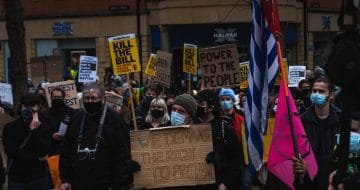Bar grad Abbas Hussain analyses the High Court’s ruling on police powers in the Public Order Act 2023

The High Court’s recent decision declaring that the new police powers for protests are unlawful, marks a pivotal moment in the UK’s legal landscape. This case arose from the controversial expansion of police authority to manage protests, ostensibly to curb disruptive demonstrations by groups such as Extinction Rebellion and Just Stop Oil. These amendments included broad powers to impose conditions on protests deemed to cause “serious disruption” and introduced new offenses like “locking-on” and “tunnelling.”
The legislation in question, part of the Public Order Act 2023, aimed to enhance police capabilities in managing protests that significantly disrupt public order. Critics, however, have argued that these measures were overly broad, threatening the fundamental rights to peaceful assembly and expression. The High Court’s intervention came after legal challenges from civil rights groups who contended that the law was both procedurally flawed and substantively excessive.
Lack of comprehensive consultation
The court found that the Secretary of State did not adequately consult with a wide range of stakeholders. While law enforcement agencies were consulted, the exclusion of human rights organisations and other relevant groups was deemed a critical oversight. The court emphasised that such consultations are essential to ensure that new laws are not only effective but also respectful of civil liberties.
This aspect of the judgment underscores the necessity for an inclusive legislative process. Effective laws require input from diverse perspectives to balance enforcement needs with civil rights protections. The ruling sets a precedent that future legislative efforts must engage more comprehensively with affected stakeholders to ensure balanced outcomes. The court’s decision sends a clear message that the government must prioritise transparency and inclusivity when drafting laws that impact fundamental rights.
From a critical standpoint, the court’s emphasis on comprehensive consultation is a crucial reminder that democracy thrives on diverse input and scrutiny. When legislation, especially one that curtails freedoms, is enacted without adequate consultation, it risks alienating the public and eroding trust in the legal system. By mandating a more inclusive approach, the judgment helps safeguard against authoritarian tendencies and ensures that civil liberties are not sacrificed at the altar of public order.
Balancing public order and civil liberties
Secondly, the High Court criticised the new powers for disproportionately targeting peaceful protests. The judgment highlighted that, while maintaining public order is important, it should not come at the expense of fundamental rights. The law’s broad definitions and low thresholds for imposing restrictions were found to potentially deter lawful and peaceful protests.
Want to write for the Legal Cheek Journal?
Find out moreThis ruling reaffirms the judiciary’s role in safeguarding civil liberties against excessive state control. It indicates that any future laws restricting protests must be carefully crafted to avoid infringing on the right to peaceful assembly. This balance is crucial to maintaining a democratic society where dissent and public demonstration are protected rights.
Critically, this finding reflects a profound understanding of the delicate equilibrium between security and freedom. It challenges the notion that public order can only be maintained through stringent controls and instead advocates for a nuanced approach that respects individual rights. By striking down overreaching powers, the court not only protects protest rights but also reinforces the idea that effective governance involves accommodating, rather than suppressing, public dissent.
Clarity and precision in legislation
Lastly, the court found that terms like “serious disruption” were too vaguely defined, leading to potential arbitrary enforcement. Clear and precise language in legislation is necessary to ensure consistent application and to protect individuals from unjustified restrictions on their rights.
Future legislative measures must include precise definitions and clear guidelines to prevent misuse or overreach of powers. This clarity is essential in maintaining public trust and ensuring that law enforcement actions are proportionate and justified.
From a legal analysis perspective, this insistence on clarity and precision in legislative language is a safeguard against potential abuses of power. Vague laws grant excessive discretion to law enforcement, which can lead to inconsistent and biased application. By demanding specific definitions, the court ensures that citizens are aware of the boundaries of lawful conduct and that their rights are protected against arbitrary infringements.
Legal analysis and precedent
This judgment not only nullified the new police powers enacted in the Public Order Act 2023, but also established a legal precedent by demanding comprehensive stakeholder consultations, clear legislative definitions, and careful consideration of human rights. The court’s willingness to invalidate laws that do not meet constitutional and human rights standards sends a strong message to lawmakers. It reaffirms that legislative bodies must meticulously consider the balance between security and liberty and engage in thorough consultations before enacting laws that significantly impact civil rights.
From a legal perspective, this ruling is a robust affirmation of the UK’s commitment to democratic principles and human rights. It highlights the judiciary’s essential role in reviewing and potentially overturning executive and legislative actions that threaten civil liberties, and it reinforces the judiciary’s role as a guardian of civil liberties by checking government overreach and ensuring that the UK’s legal framework continues to protect the fundamental rights of its citizens.
This decision will likely influence future legislative practices, encouraging more rigorous and inclusive processes that adequately weigh the impacts on fundamental rights.
Abbas Hussain, a BPC graduate, is a school governor at Ark and a member of the BTB Academy 2023-2024 cohort with a keen interest in commercial and public law.
 (
( (
(

